Key takeaways:
- Interviewing relatives can uncover hidden family stories and deepen emotional connections.
- Creating a comfortable atmosphere and asking open-ended questions fosters richer dialogue.
- Documenting interviews thoughtfully ensures that personal insights and emotions enhance the historical facts.
- Following up after interviews can reinforce relationships and encourage further sharing of family stories.
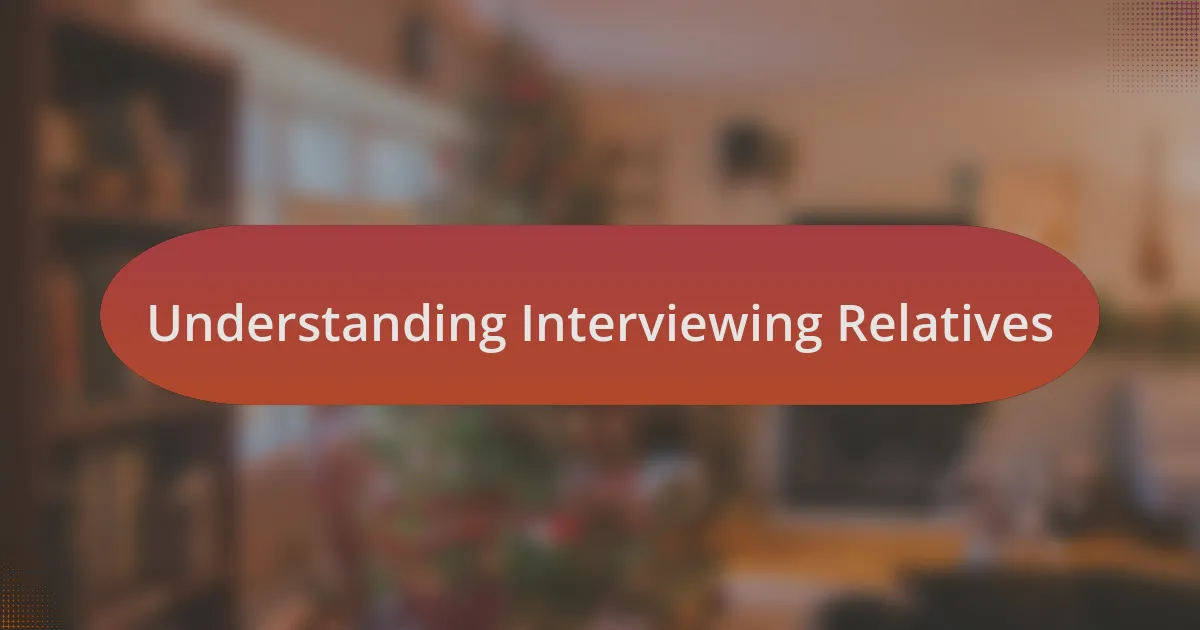
Understanding Interviewing Relatives
Interviewing relatives is a fascinating and sometimes emotionally charged process. When I interviewed my grandmother, I discovered stories I never knew existed, which brought me closer to her and our family’s past. It’s remarkable how a simple question can unlock memories that have been tucked away for years, isn’t it?
One of the key elements to understand is that these conversations can evoke strong feelings. I once asked my uncle about his childhood during the war, and I could see the mix of pride and pain in his eyes. It made me realize that while I was gathering information, I was also touching on deep emotions that shaped his life. How do you approach such sensitive topics without overwhelming your relatives?
As you navigate these discussions, ask open-ended questions that encourage dialogue rather than yes-or-no responses. This approach not only fosters a richer exchange but also shows your relatives that you value their experiences. For instance, instead of asking if they liked their hometown, I would ask what their most cherished memory is from that place. This method transforms the interview into a shared storytelling session, allowing both of you to connect over family history.
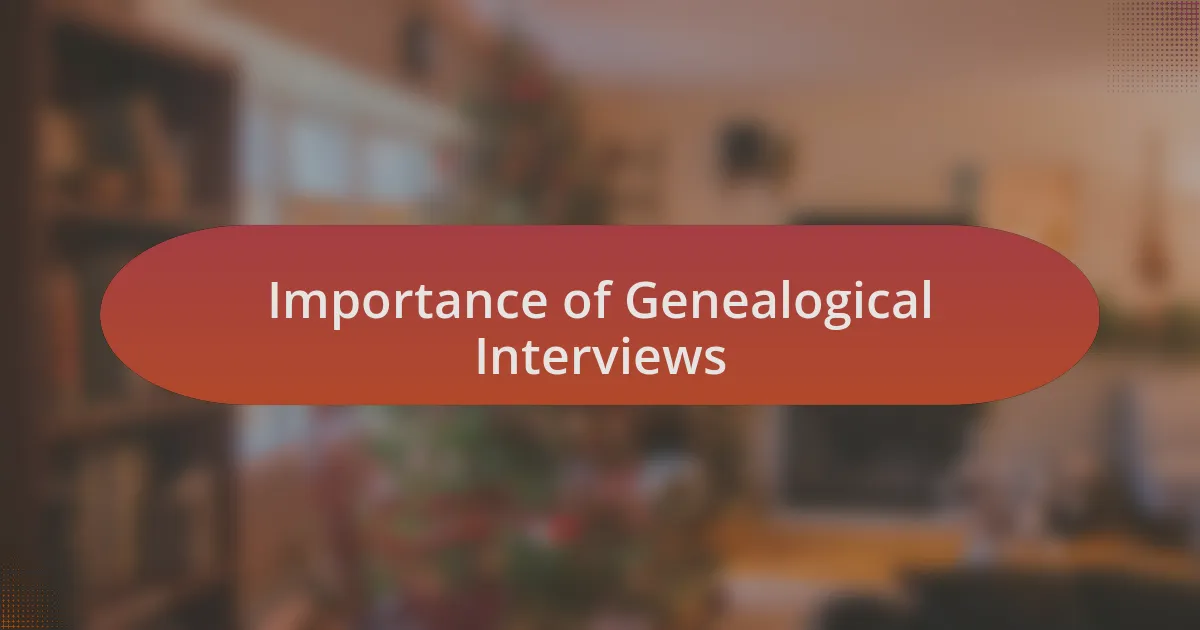
Importance of Genealogical Interviews
When it comes to uncovering family history, genealogical interviews serve as a crucial bridge to our roots. I recall a heartwarming moment when my aunt recounted her experiences as a young mother balancing work and family. Her laughter as she shared memories of her “creative” cooking experiments not only revealed her personality but also painted a vivid picture of life in those times. How often do we miss out on such beautiful facets of our family narratives?
These interviews also offer a chance to preserve family traditions and stories for future generations. During a conversation with my cousin, we unveiled the significance of a unique family recipe that had been passed down without a written record. The exchange not only helped us relive the joy of family gatherings but also ignited a sense of responsibility to keep that tradition alive. Isn’t it fascinating how these dialogues can transform abstract history into tangible legacy?
Moreover, emotional connections often deepen through these discussions, making them invaluable. I found it incredibly moving when my grandfather shared not just dates and facts but heartfelt tales of his youth, filled with love and loss. It struck me that every detail he provided was a thread connecting us to a legacy of resilience and hope. How could we not cherish and honor the stories that shape who we are?
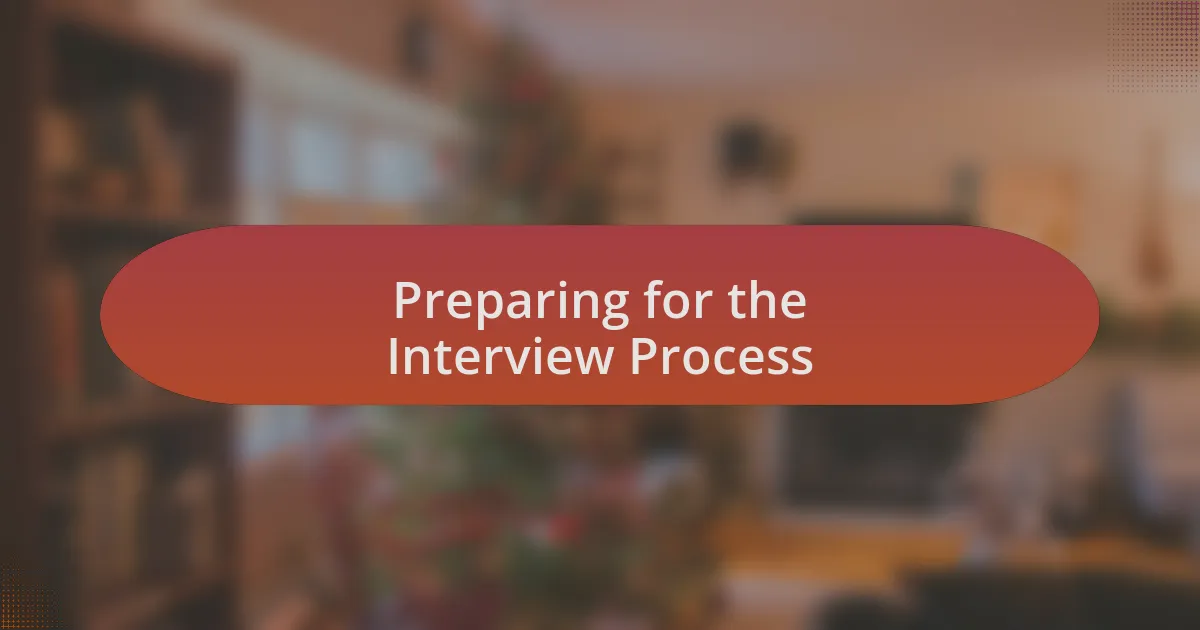
Preparing for the Interview Process
When preparing for the interview process, it’s essential to create a comfortable environment. I remember setting up a cozy chair and offering my grandmother her favorite tea before we began our conversation. This simple act made her relax, and it allowed her to share stories freely. Have you considered how a little comfort can unlock a treasure trove of memories?
Next, having a list of thoughtful questions can guide your discussion. I’ve found that open-ended questions often lead to richer stories. For instance, rather than asking, “Did you like school?” I’d ask, “What was your most memorable moment from school?” This not only engages the interviewee but also sparks deeper reflections. How do you frame your questions to elicit more than just yes or no answers?
Lastly, I suggest recording the interview, with permission, to capture every detail without distraction. I once conducted an interview with my father using my phone’s voice memo function, and hearing his stories again revealed nuances I missed during the conversation. It’s amazing how revisiting these dialogues can deepen our understanding. How do you plan to preserve the invaluable insights you gather?

Creating a Comfortable Atmosphere
Creating a comfortable atmosphere is key to retrieving those cherished family stories. I recall one time when I interviewed my aunt; I brought out some family photos from a past reunion, and instantly, nostalgia wrapped around us like a warm blanket. Have you ever noticed how memories tied to a visual cue can loosen someone’s tongue?
It’s also important to be mindful of your surroundings. I prefer conducting interviews in familiar settings for the interviewee, like their living room, surrounded by items that evoke memories. This approach always opens up conversations about significant moments related to those items. What elements in their environment might spark a deeper story for you, too?
Lastly, authenticity plays a crucial role in creating that comfortable vibe. During one interview, I shared a funny childhood story of my own, which eased the tension and made my uncle laugh. This exchange shifted the atmosphere from formal to familial, paving the way for him to share his own light-hearted moments. How can your personal stories bridge the gap and enhance the comfort level in your interviews?

Essential Questions to Ask
When interviewing relatives, asking about family traditions can open a treasure trove of stories. I remember sitting with my grandmother and asking about her favorite holiday celebrations. As she spoke, her eyes lit up with memories of baking cookies and the laughter of family gatherings; those little details not only connected me to our heritage but also highlighted the emotions tied to those experiences. Have you considered which traditions might reveal layers of your family’s history?
Don’t underestimate the power of asking about pivotal life events. I once asked my father how he chose his career path, and he shared a heartfelt story about his father’s encouragement during tough times. That moment revealed not just the decision-making process but also the values that have shaped our family’s legacy. What key events could shed light on the choices your relatives made, helping you understand their journeys?
Inquiring about challenges faced by family members provides insight into their resilience. During a discussion with my aunt, I asked her about a difficult period she experienced as a young mother. The raw emotion in her voice as she recounted her struggles and triumphs painted a vivid picture of her strength, offering me a profound appreciation for her life. How might these stories of overcoming adversity enrich your understanding of your family’s narrative?
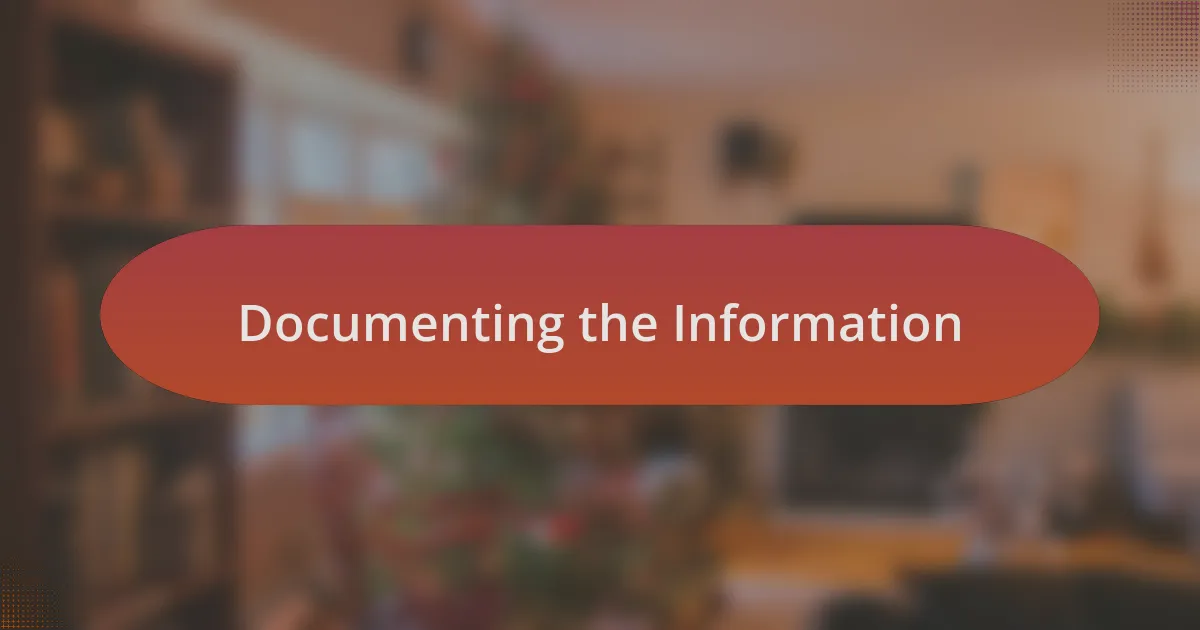
Documenting the Information
When it comes to documenting the information you gather, clarity is crucial. I’ve found that writing notes immediately after an interview ensures that the emotions and details are still fresh in my mind. During one particularly poignant interview with my uncle, I scribbled down his stories about migrating to a new country, and these notes became the foundation for a family history project. Have you thought about how your immediate impressions could enhance the facts you collect?
Digital tools can be incredibly useful for organizing family interviews. One time, I recorded a conversation with my aunt using my smartphone, which allowed me to capture her laughter and the warmth of her voice, adding depth to the words. Listening back, I realized how much emotion was woven into her stories, enriching my understanding of our lineage. What tools can you employ to ensure that the essence of your family’s stories is preserved alongside the facts?
It’s important to go beyond just names and dates when documenting family stories. I’ve learned to include personal insights and anecdotes that breathe life into the data. For instance, when I noted my grandmother’s description of her childhood home, I also captured her feelings of nostalgia as she reminisced about the creaky floors and the scent of fresh bread. What memories can you weave into your family tree to turn dry statistics into meaningful narratives?
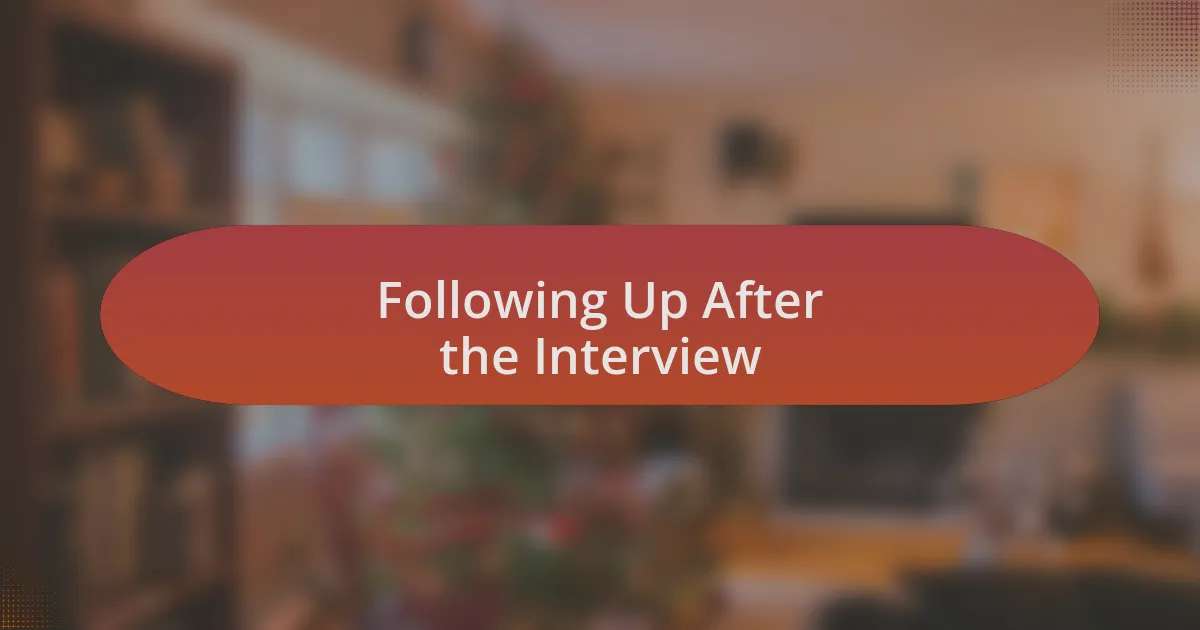
Following Up After the Interview
Following up after an interview is an essential step that often gets overlooked, but its impact can be significant. I once reached out to my cousin a week after our conversation to thank her for sharing her story about our grandfather’s childhood. Not only did it strengthen our bond, but it also opened the door for her to elaborate on details she hadn’t mentioned, which provided me with richer insights into our family history. How often do we miss the chance to deepen our understanding by simply showing appreciation?
Sending a follow-up email or message can serve a dual purpose; it provides you with an opportunity to clarify any points and correct any misunderstandings. During a follow-up with my aunt, she realized she had mixed up the dates of a significant event, and we were able to resolve that confusion together. This exchange didn’t just enhance my research; it also sparked further dialogue that brought even more stories to light. What might you discover if you re-engage with your relatives after an interview?
Additionally, I’ve found that sharing the fruits of an interview can be incredibly rewarding. After compiling some of my mom’s stories, I created a small family booklet and sent it to her as a surprise. The joy in her voice when she received it reminded me of the value of preserving our family stories. Have you considered how sharing your work could inspire others in your family to contribute their own memories?